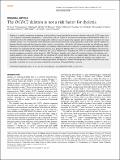Files in this item
The DCDC2 deletion is not a risk factor for dyslexia
Item metadata
| dc.contributor.author | Scerri, Thomas S. | |
| dc.contributor.author | Macpherson, Ellen | |
| dc.contributor.author | Martinelli, Angela | |
| dc.contributor.author | Wa, Wong Cheuk | |
| dc.contributor.author | Monaco, Anthony P. | |
| dc.contributor.author | Stein, John | |
| dc.contributor.author | Zheng, Mo | |
| dc.contributor.author | Ho, Connie Suk-Han | |
| dc.contributor.author | McBride, Catherine | |
| dc.contributor.author | Snowling, Margaret | |
| dc.contributor.author | Hulme, Charles | |
| dc.contributor.author | Hayiou-Thomas, Marianna E. | |
| dc.contributor.author | Waye, Mary M. Y. | |
| dc.contributor.author | Talcott, Joel B. | |
| dc.contributor.author | Paracchini, Silvia | |
| dc.date.accessioned | 2017-07-26T14:30:08Z | |
| dc.date.available | 2017-07-26T14:30:08Z | |
| dc.date.issued | 2017-07-25 | |
| dc.identifier | 250224100 | |
| dc.identifier | 7093019f-0425-4d50-8cd2-67299cde7dc3 | |
| dc.identifier | 85046053311 | |
| dc.identifier | 000406715200008 | |
| dc.identifier.citation | Scerri , T S , Macpherson , E , Martinelli , A , Wa , W C , Monaco , A P , Stein , J , Zheng , M , Ho , C S-H , McBride , C , Snowling , M , Hulme , C , Hayiou-Thomas , M E , Waye , M M Y , Talcott , J B & Paracchini , S 2017 , ' The DCDC2 deletion is not a risk factor for dyslexia ' , Translational Psychiatry , vol. 7 , e1182 . https://doi.org/10.1038/tp.2017.151 | en |
| dc.identifier.issn | 2158-3188 | |
| dc.identifier.other | ORCID: /0000-0001-9934-8602/work/60428070 | |
| dc.identifier.uri | https://hdl.handle.net/10023/11295 | |
| dc.description | SP is a Royal Society University Research Fellow. EM was the recipient of a Wolfson Intercalated Award. Support to the analysis was provided by the St Andrews Bioinformatics Unit funded by the Wellcome Trust [grant 105621/Z/14/Z]. Analysis of the York cohort was supported by a Trust Programme Grant to MJS [WT082032MA]. Assessment of the Aston cohort was supported by funding from The Waterloo Foundation to JBT and SP [797-1720]. The work on the Chinese-English Twin Study of Biliteracy was supported by a Hong Kong Collaborative Research Fund (CUHK8/CRF/13G) award to CM, CH, and MW, The Chinese University of Hong Kong VCF2014023 fund awarded to CM, and a SULSA Hong-Kong/Scotland Collaborative Partnership award to SP and CM. | en |
| dc.description.abstract | Dyslexia is a specific impairment in learning to read and has strong heritability. An intronic deletion within the DCDC2 gene, with ~8% frequency in European populations, is increasingly used as a marker for dyslexia in neuroimaging and behavioural studies. At a mechanistic level, this deletion has been proposed to influence sensory processing capacity, and in particular sensitivity to visual coherent motion. Our re-assessment of the literature, however, did not reveal strong support for a role of this specific deletion in dyslexia. We also analysed data from five distinct cohorts, enriched for individuals with dyslexia, and did not identify any signal indicative of associations for the DCDC2 deletion with reading-related measures including in a combined samples (N =526). We conducted the first replication analysis for a proposed deletion effect on visual motion perception and found no association (N = 445 siblings). We also report that the DCDC2 deletion has a frequency of 37.6% in a cohort representative of the general population recruited in Hong Kong (N = 220). This figure, together with a lack of association between the deletion and reading abilities in this cohort, indicates the low likelihood of a direct deletion effect on reading skills. Therefore, on the basis of multiple strands of evidence, we conclude that the DCDC2 deletion is not a strong risk factor for dyslexia. Our analyses and literature re-evaluation are important for interpreting current developments within multidisciplinary studies of dyslexia and, more generally, contribute to current discussions about the importance of reproducibility in science. | |
| dc.format.extent | 7 | |
| dc.format.extent | 168757 | |
| dc.language.iso | eng | |
| dc.relation.ispartof | Translational Psychiatry | en |
| dc.subject | QH426 Genetics | en |
| dc.subject | RC0321 Neuroscience. Biological psychiatry. Neuropsychiatry | en |
| dc.subject | NDAS | en |
| dc.subject | BDC | en |
| dc.subject.lcc | QH426 | en |
| dc.subject.lcc | RC0321 | en |
| dc.title | The DCDC2 deletion is not a risk factor for dyslexia | en |
| dc.type | Journal article | en |
| dc.contributor.sponsor | The Wellcome Trust | en |
| dc.contributor.institution | University of St Andrews. School of Medicine | en |
| dc.contributor.institution | University of St Andrews. Cellular Medicine Division | en |
| dc.contributor.institution | University of St Andrews. Biomedical Sciences Research Complex | en |
| dc.identifier.doi | https://doi.org/10.1038/tp.2017.151 | |
| dc.description.status | Peer reviewed | en |
| dc.date.embargoedUntil | 2017-07-25 | |
| dc.identifier.grantnumber | 105621/Z/14/Z | en |
This item appears in the following Collection(s)
Items in the St Andrews Research Repository are protected by copyright, with all rights reserved, unless otherwise indicated.

